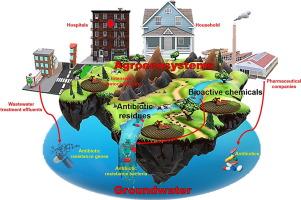Ecological consequences of antimicrobial residues and bioactive chemicals on antimicrobial resistance in agroecosystems
IF 11.4
1区 综合性期刊
Q1 MULTIDISCIPLINARY SCIENCES
引用次数: 0
Abstract
Background
The widespread use of antimicrobials in agriculture, coupled with bioactive chemicals like pesticides and growth promoting agents, has accelerated the global crisis of antimicrobial resistance (AMR). Agroecosystems provides a platform in the evolution and dissemination of antibiotic-resistant bacteria (ARB) and antibiotic resistance genes (ARGs), which pose significant threats to both environmental and public health.Aim of review
This review explores the explores the ecological consequences of antimicrobial residues and bioactive chemicals in agroecosystems, focusing on their role in shaping AMR. It delves into the mechanisms by which these substances enter agricultural environments, their interaction with soil microbiomes, and the subsequent impact on microbial community structure.Key scientific concepts of review
Evidence suggests that the accumulation of antimicrobials promotes resistance gene transfer among microorganisms, potentially compromising ecosystem health and agricultural productivity. By synthesizing current research, we identify critical gaps in knowledge and propose strategies for mitigating the ecological risks associated with antimicrobial residues. Moreover, this study underscores the need for integrated management approaches to preserve ecosystem health and combat the spread of AMR in agricultural settings.

抗菌剂残留和生物活性化学品对农业生态系统中抗菌剂耐药性的生态影响
背景抗菌素在农业中的广泛使用,加上杀虫剂和生长促进剂等生物活性化学品,加速了全球抗菌素耐药性(AMR)危机。农业生态系统为抗生素耐药细菌(ARB)和抗生素耐药基因(ARGs)的进化和传播提供了平台,对环境和公共健康构成了重大威胁。综述的主要科学概念有证据表明,抗菌剂的积累会促进微生物间抗药性基因的转移,从而可能损害生态系统健康和农业生产力。通过综合当前的研究,我们找出了知识方面的关键差距,并提出了减轻与抗菌剂残留相关的生态风险的策略。此外,这项研究还强调了采取综合管理方法的必要性,以保护生态系统健康并遏制 AMR 在农业环境中的传播。
本文章由计算机程序翻译,如有差异,请以英文原文为准。
求助全文
约1分钟内获得全文
求助全文
来源期刊

Journal of Advanced Research
Multidisciplinary-Multidisciplinary
CiteScore
21.60
自引率
0.90%
发文量
280
审稿时长
12 weeks
期刊介绍:
Journal of Advanced Research (J. Adv. Res.) is an applied/natural sciences, peer-reviewed journal that focuses on interdisciplinary research. The journal aims to contribute to applied research and knowledge worldwide through the publication of original and high-quality research articles in the fields of Medicine, Pharmaceutical Sciences, Dentistry, Physical Therapy, Veterinary Medicine, and Basic and Biological Sciences.
The following abstracting and indexing services cover the Journal of Advanced Research: PubMed/Medline, Essential Science Indicators, Web of Science, Scopus, PubMed Central, PubMed, Science Citation Index Expanded, Directory of Open Access Journals (DOAJ), and INSPEC.
 求助内容:
求助内容: 应助结果提醒方式:
应助结果提醒方式:


